
Helene Kröller-Müller was a German art collector. She was one of the first European women to put together a major art collection. She is credited with being one of the first collectors to recognise the genius of Vincent van Gogh. Her entire collection was eventually sold to the Dutch government, along with her and her husband, Anton Kröller's, large forested country estate. Today it is the Kröller-Müller Museum and sculpture garden and Hoge Veluwe National Park, one of the largest national parks in the Netherlands.

The Rijksmuseum is the national museum of the Netherlands dedicated to Dutch arts and history and is located in Amsterdam. The museum is located at the Museum Square in the borough of Amsterdam South, close to the Van Gogh Museum, the Stedelijk Museum Amsterdam, and the Concertgebouw.
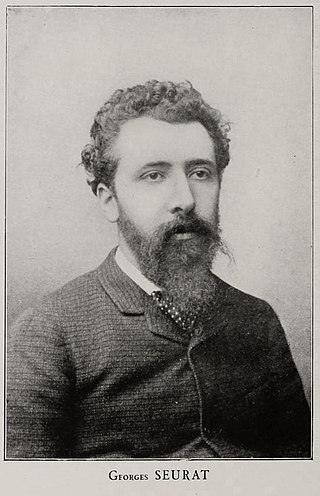
Georges Pierre Seurat was a French post-Impressionist artist. He devised the painting techniques known as chromoluminarism and pointillism and used conté crayon for drawings on paper with a rough surface.
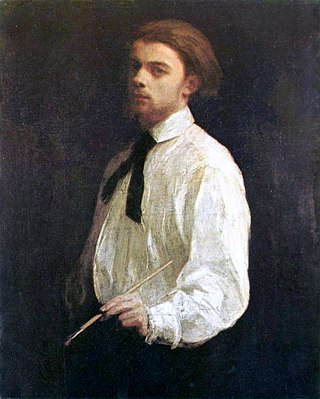
Henri Fantin-Latour was a French painter and lithographer best known for his flower paintings and group portraits of Parisian artists and writers.
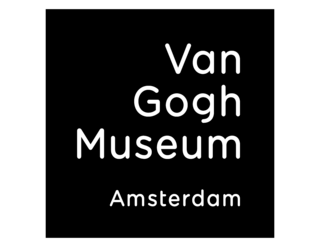
The Van Gogh Museum is a Dutch art museum dedicated to the works of Vincent van Gogh and his contemporaries in the Museum Square in Amsterdam South, close to the Stedelijk Museum, the Rijksmuseum, and the Concertgebouw. The museum opened on 2 June 1973, and its buildings were designed by Gerrit Rietveld and Kisho Kurokawa.

Post-Impressionism was a predominantly French art movement that developed roughly between 1886 and 1905, from the last Impressionist exhibition to the birth of Fauvism. Post-Impressionism emerged as a reaction against Impressionists' concern for the naturalistic depiction of light and colour. Its broad emphasis on abstract qualities or symbolic content means Post-Impressionism encompasses Les Nabis, Neo-Impressionism, Symbolism, Cloisonnism, the Pont-Aven School, and Synthetism, along with some later Impressionists' work. The movement's principal artists were Paul Cézanne, Paul Gauguin, Vincent van Gogh and Georges Seurat.

Pointillism is a technique of painting in which small, distinct dots of color are applied in patterns to form an image.

Paul Victor Jules Signac was a French Neo-Impressionist painter who, with Georges Seurat, helped develop the artistic technique Pointillism.
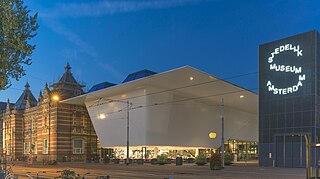
The Stedelijk Museum Amsterdam, colloquially known as the Stedelijk, is a museum for modern art, contemporary art, and design located in Amsterdam, Netherlands.

Anthonij "Anton" Rudolf Mauve was a Dutch realist painter who was a leading member of the Hague School. He signed his paintings 'A. Mauve' or with a monogrammed 'A.M.'. A master colorist, he was a very significant early influence on his cousin-in-law Vincent van Gogh.

The Hague School is a group of artists who lived and worked in The Hague between 1860 and 1890. Their work was heavily influenced by the realist painters of the French Barbizon school. The painters of the Hague school generally made use of relatively somber colors, which is why the Hague School is sometimes called the Gray School.

Isaac Lazarus Israëls was a Dutch painter associated with the Amsterdam Impressionism movement.

Bathers at Asnières is an 1884 oil on canvas painting by French artist Georges Pierre Seurat, the first of his two masterpieces on the monumental scale. The canvas is of a suburban, placid Parisian riverside scene. Isolated figures, with their clothes piled sculpturally on the riverbank, together with trees, austere boundary walls and buildings, and the River Seine are presented in a formal layout. A combination of complex brushstroke techniques and a meticulous application of contemporary color theory bring to the composition a sense of gentle vibrancy and timelessness.

Fauvism is a style of painting and an art movement that emerged in France at the beginning of the 20th century. It was the style of les Fauves, a group of modern artists whose works emphasized painterly qualities and strong colour over the representational or realistic values retained by Impressionism. While Fauvism as a style began around 1904 and continued beyond 1910, the movement as such lasted only a few years, 1905–1908, and had three exhibitions. The leaders of the movement were André Derain and Henri Matisse.
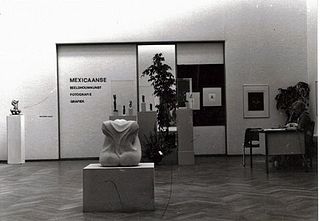
Pulchri Studio is a Dutch art society, art institution and art studio based in The Hague ('s-Gravenhage), Netherlands.

Still life paintings by Vincent van Gogh (Paris) is the subject of many drawings, sketches and paintings by Vincent van Gogh in 1886 and 1887 after he moved to Montmartre in Paris from the Netherlands. While in Paris, Van Gogh transformed the subjects, color and techniques that he used in creating still life paintings.

Baigneuses: Deux nus dans un paysage exotique is an oil painting created circa 1905 by the French artist and theorist Jean Metzinger (1883–1956). Two Nudes in an Exotic Landscape is a Proto-Cubist work executed in a highly personal Divisionist style during the height of the Fauve period. The painting is part of Carmen Cervera's art collection and its exhibited in the Thyssen-Bornemisza Museum, Madrid

Jan Hillebrand Wijsmuller was a Dutch painter. He belongs to The 2. Golden Age of Dutch Painting.
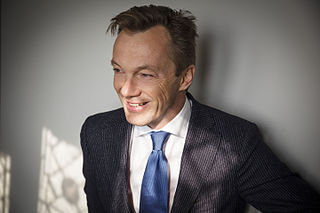
Willem Meint Jans "Wim" Pijbes is a Dutch art historian and emeritus General Director of the Rijksmuseum, Amsterdam.
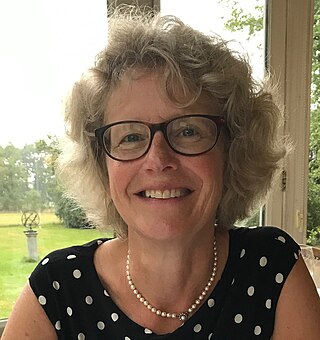
Liesbeth Heenk is an international publisher, author and art historian specialised in Vincent van Gogh. She is the founder of Amsterdam Publishers which is the largest international publisher of Holocaust memoirs in Europe.




















